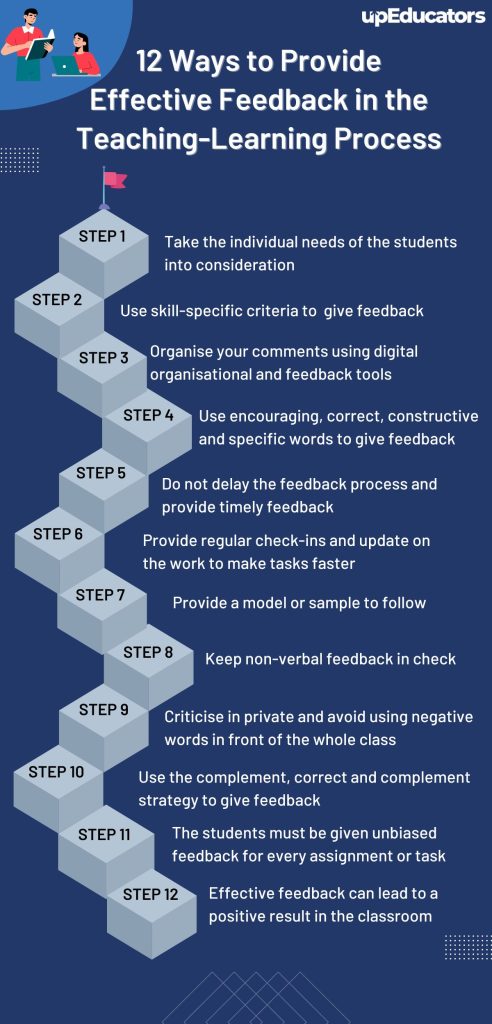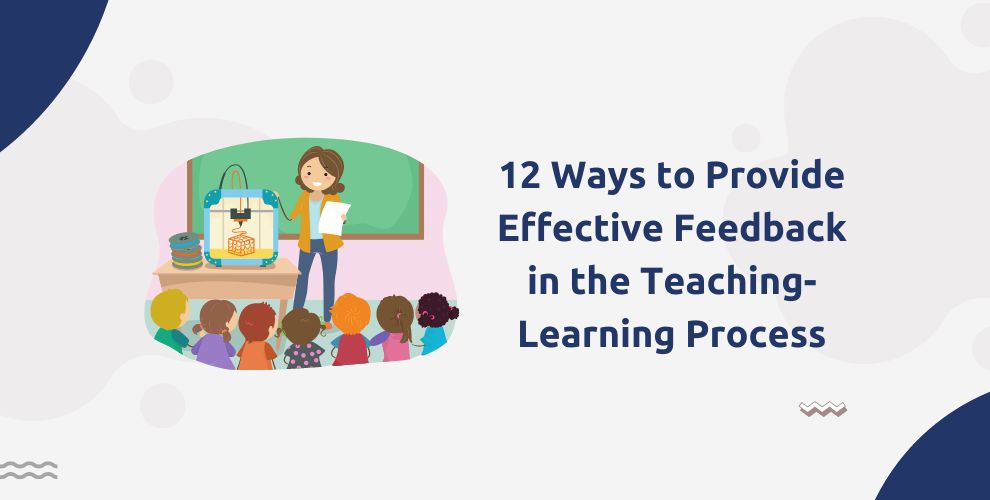A teacher’s most important role is to provide an environment where learners can grow and develop. However, this cannot happen without feedback on the learner’s performance. Feedback is important because it helps the learner know whether they are on the right track or what they need to work on something. It is a process that helps learner adjust their progress. It is a way of guiding and facilitating learning.

A study shows that negative feedback can discourage students. This study proves that a controlling source must ensure that the feedback provided in a classroom environment is not negative but affirmative. The evaluative process must lead to improvement and not discouragement. This does not mean that a teacher should not be critical of a student’s work. Effective feedback is built upon the foundation of three principles:
- It discusses what tasks or parts of an assignment are performed well.
- It provides concrete and corrective points for future improvements.
- It also builds mutual trust and respect between the originator and the receiver.
Types of Feedback
In a formal educational setup, there are five different ways to provide feedback.
- Informal Feedback: Informal feedback is unplanned feedback that can occur spontaneously. This kind of feedback builds upon a rapport with the students and can be provided in a classroom or an informal setting like over a phone call.
- Formal Feedback: Formal feedback is planned and scheduled. It takes place through a formal medium and provides an organised record of the performances.
- Formative Feedback: Students need to be informed about certain expected standards from a task so that they can avoid repeating common mistakes. Formative assessment fulfils this task and is usually given during or before a lesson.
- Summative Feedback: Summative Feedback focuses on evaluating a task after its completion. It involves detailed comments and corrective points for improvement and also explains the criteria for the judgment.
- Student-Peer Feedback: When it comes to giving and receiving feedback, students can often be their own best critics. This is why incorporating peer feedback into the classroom can be such a valuable tool. Not only does it provide students with an opportunity to hear from their peers, but it also gives them a chance to see how their feedback compares to that of their classmates.
Ways to Provide Effective Feedback in the teaching-learning process :
1. Keep the individual needs of the students into consideration:
Every student in a classroom is different. Then how can a teacher expect to follow similar approaches to evaluating and motivating them? A teacher needs to pay attention to the individual needs of the students in the classroom as it results in improving the overall performance of the class.
A recent study by The Teacher Empowerment Survey states that more than 65% of teachers who are unable to find enough time to provide personalised and individualised feedback to students find it difficult to get along with a student. According to this survey, a personalised approach to feedback in the classroom helps in the following ways.
- A motivator for teachers: Being able to give personal attention to every student motivates teachers and makes them about 78% charged up to show up in the classroom every day.
- Building positive relationships with students: Giving attention to the individual needs of students while giving feedback helps teachers in building rapport and positive relationships with every student in the classroom.
2. Use a skill or specific criteria to give feedback:
Vagueness in the feedback process can destroy the purpose of evaluation. As already mentioned, focusing on a specific task, skill or criteria is a crucial part of constructive feedback in the classroom. Being specific while providing feedback helps in a better understanding of its relevance.
There are a lot of educational tools and methods that can help in providing specific feedback. For instance, teachers can provide written responses or use the tools of annotating the students’ assignments. It might take time but it will make the feedback process more effective. Teachers can also make use of digital tools like Rubrics to provide effective, specific and better feedback.
3. Organise Your Comments
According to an article posted by Indeed, developing organisational skills is crucial for a 21st-century teacher. These organisational skills can also become a breeding ground for effective feedback. The feedback and evaluation tend to get lost once you have provided them. A teacher must maintain a record of the daily or weekly comments provided by them to every student. This can either be done physically or digitally.
Physical Organising tools: Teachers can maintain a notebook and jot down the comments provided to every student against their names in the notebook.
Digital Organising tools: Teachers can make use of digital tools like spreadsheets to maintain a digital record of every comment and feedback provided to the students.
Organising the daily or weekly comments in one place will not only make the feedback accessible but will also aid in tracking the progress of a student based on the comments provided by the teacher.
4. Use Encouraging, Correct and Specific constructive words
“Good job.” “Nice work.” These phrases are positive but they are not enough to provide effective feedback to students. Teachers need to drop vague words and phrases and make a switch to specific words, phrases and sentences that would help in making evaluation more effective. Here are some examples from a Twitter thread that discussed a long list of phrases and words that teachers use for effective feedback in the classroom.
- “You opened up a door in my mind.”
- “What you are doing here reminds me of…”
- “You navigate this topic in such an engaging way, especially by….”
- “This part shows me that you have improved with (insert skill) because compared to last time…”
- “Your writing makes me think…”
- “Please redo this part of the assignment as per the instructions”
Using such specific points would encourage students to listen and use your feedback for improvements. It will also show that you have taken a good amount of time to go through their assignment. Constructive words in feedback help in the development of the students instead of discouraging them with blatant words.
5. Provide a timely feedback
According to a survey, 50% of students preferred immediate feedback while 22% of students wanted delayed feedback and the rest o the students were not bothered about the timings but the methods of evaluation.
Feedback should not be delayed in the teaching-learning process. The students who receive feedback within 24-48 hours tend to perform better and retain more information from the class. Here’s how delayed feedback does more harm than provides benefits to students.
- If feedback is delayed for a long time, then the students may end up losing the context of the evaluation when it is finally presented.
- It restricts the opportunities for improvement in students as students may lose the motivation to consider the feedback.
- It can also slow down the pace of progress for the whole classroom.
- It can lead to confusion and frustration in a student and discourage him/her from implementing the comments provided by the teacher.
6. Regular Check-ins
Students need regular approval and surrey about their performance. It helps them in developing academically, socially and sometimes even emotionally. Teachers must ensure that they build a relationship with students by carrying out a weekly checking-in session with every student.
Teachers must ask specific questions after assigning a task or project. They must also keep getting reassurance from students between lessons about their understanding levels. Here are some questions that teachers can ask their students for regular check-ins.
- What was your favourite part of the class today?
- What’s the biggest thing I could do to help you learn today?
- What was confusing or difficult to learn for you today?
- What was the most difficult part for you last week?
- Would you like to get some personal help with this lesson?
Such questions will help teachers in building positive relationships with students in the class and improve the overall learning experience.
7. Provide a model or sample to follow
Most students are clueless about new lessons and topics introduced in the classroom. An educator must provide information in a way that these students do not feel left out. Before assigning a task for which you will provide feedback in the future, make sure that you are providing a model to follow.
A teacher can provide students with sample assignments and show them submissions that were graded differently. This will help them in understanding why a paper is given a low grade or a higher grade which would eventually enhance their work.
8. Keep non-verbal feedback in check
Body language and facial expressions are important means to provide feedback in different environments and settings. Teachers must train themselves to provide non-verbal feedback efficiently. Control your frowns and keep a check on your body language while interacting with the students. Reflect positive body language and facial expressions to look approachable to students while providing feedback.
9. Be critical in private
Calling out students and criticising them in front of their peers will not only embarrass them, but it can even lead them to shut out a teacher and never listen to her/him. Use better ways to communicate and criticise them for a task.
- Use post-it notes to keep them on task. Share these post-it notes in their notebooks or just drop them on their desks.
- Reach out to them via email to provide a critical comment.
10. Compliment, Correct and Compliment Strategy
This strategy is also known as the feedback sandwich. Teachers can use this approach to provide effective feedback to students. Firstly, teachers must compliment the students on a task they have completed. This means that the teachers must point out the good parts of the assignment. After praising, teachers can discuss what they did not like about the project and provide comments for correction. Once the student has corrected the assignment according to the teacher’s feedback, the teacher must provide compliments before finishing the feedback process.
11. Be unbiased
A lot of teachers have their bases against certain groups of students. These biases are based on their past performance and behaviour in class. The students must be given unbiased feedback for every assignment or task. The feedback must be dependent on the task in question and not on their previous performance if the two tasks are unrelated.
Teachers must think critically and should not hold any biases against any students in the class. Being unbiased will help in effective feedback and improve the students’ performances as well.
12. Encourage dialogues
Providing feedback in the classroom must be a two-way process. Teachers must provide feedback to students on their performance and students must also give feedback to teachers about their teaching style. Such dialogues in the classroom will improve the feedback mechanism and the learning procedure in an educational environment.
Effective feedback can lead to a positive result in the classroom. Teachers must adopt such feedbacking strategies to improve the teaching-learning process and build positive relationships with the students in the classroom. These strategies along with the personalised feedback methods will make modern-day classrooms more effective and a positive environment for students to learn, grow and get out of their comfort zones.
Author: This article is written by Samiya Rashid for upEducators blog.




